Search Result
Results for "
MET kinase inhibitor
" in MedChemExpress (MCE) Product Catalog:
2
Isotope-Labeled Compounds
| Cat. No. |
Product Name |
Target |
Research Areas |
Chemical Structure |
-
- HY-18309
-
|
|
c-Met/HGFR
VEGFR
|
Cancer
|
|
MET kinase-IN-4 is an orally active Met kinase inhibitor. MET kinase-IN-4 has potent Met kinase inhibitory activity with an IC50 value of 1.9 nM. MET kinase-IN-4 can be used for the research of cancer .
|
-
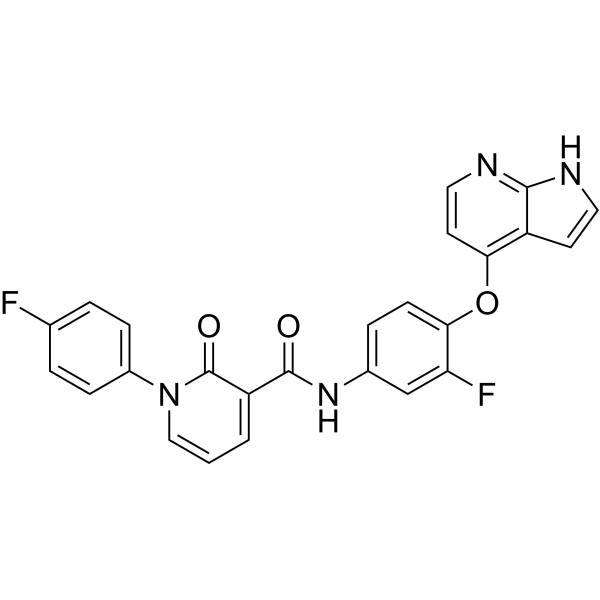
-
- HY-131065
-
|
|
c-Met/HGFR
|
Cancer
|
|
MET kinase-IN-2 is a potent, selective, orally bioavailable MET kinase inhibitor with an IC50 of 7.4 nM. MET kinase-IN-2 has antitumor activity .
|
-
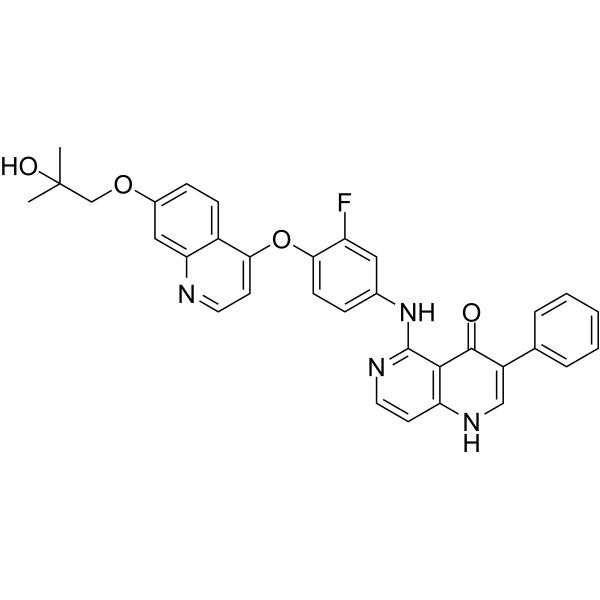
-
- HY-146884
-
|
|
c-Met/HGFR
VEGFR
|
Cancer
|
|
MET kinase-IN-3 (compound 8) is an orally active and potent MET inhibitor, with an IC50 of 9.8 nM. MET kinase-IN-3 shows good and broad-spectrum antiproliferative activity against cancer cell lines .
|
-
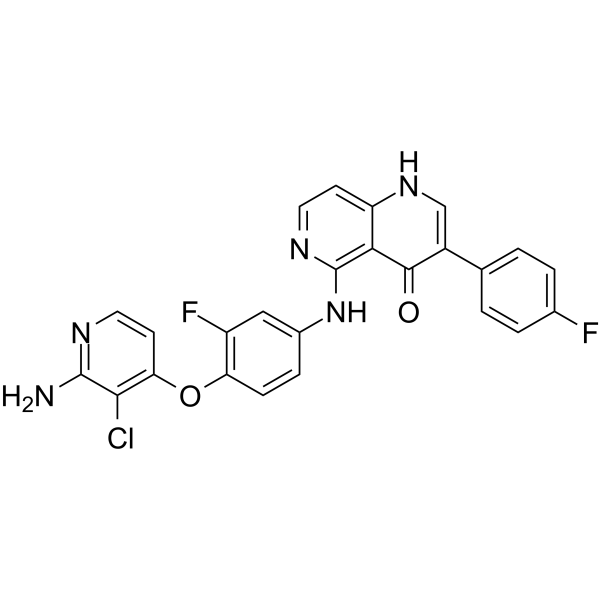
-
- HY-148279
-
|
|
c-Met/HGFR
|
Cancer
|
|
c-Met-IN-15 (compound S3) is a c-Met kinase inhibitor. c-Met-IN-15 inhibits c-Met kinase activity of 21.1% at the concentration of 10 μM .
|
-
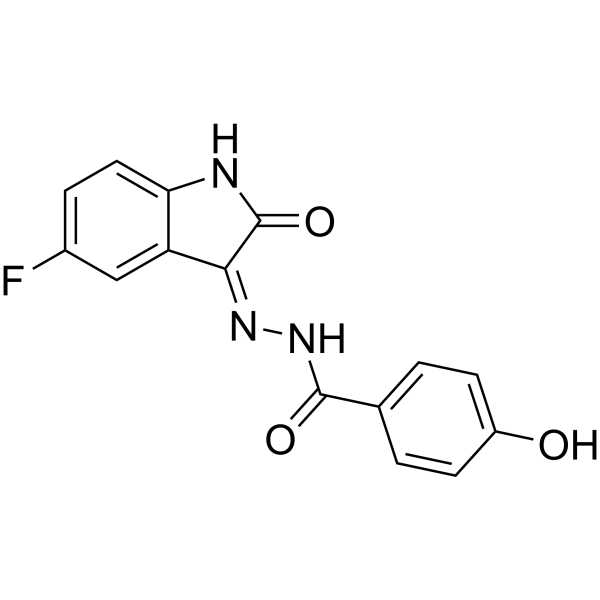
-
- HY-147695
-
|
|
c-Met/HGFR
|
Cancer
|
|
c-Met-IN-12 (compound 4r) is an orally active, potent and selective type II c-Met kinase inhibitor, with an IC50 of 10.6 nM. c-Met-IN-12 displays high inhibitory effects (inhibition rate > 80% in 1 μM) against AXL, Mer and TYRO3 kinases. c-Met-IN-12 can be used a scaffold for further kinase selectivity enhancement. c-Met-IN-12 shows antitumor efficacy .
|
-
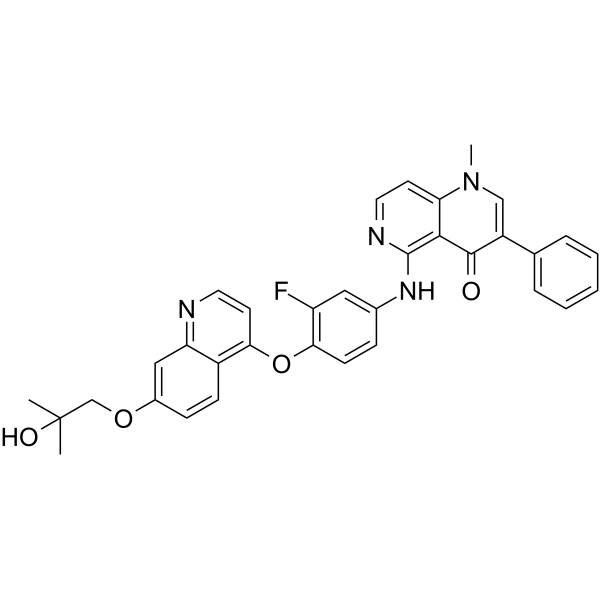
-
- HY-124267
-
|
SOMG-833
|
c-Met/HGFR
|
Cancer
|
|
Zgwatinib (SOMG-833) is a potent, selective, and ATP-competitive c-MET inhibitor, with an IC50 of 0.93 nM against c-MET, over 10,000-fold more potent compared with 19 tyrosine kinases (including c-MET family members and highly homologous kinases). Zgwatinib potently inhibits c-MET-driven cell proliferation. Zgwatinib as a potential candidate agent for c-MET-driven human cancers research .
|
-
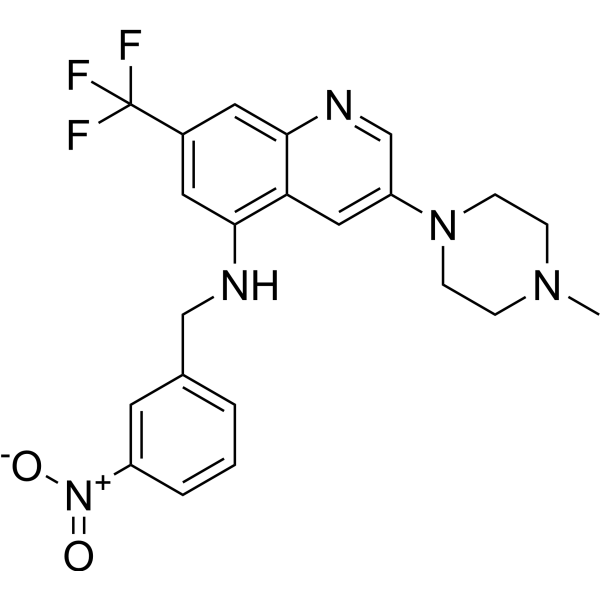
-
- HY-50686
-
|
ARQ 197; (3R,4R)-ARQ 198
|
c-Met/HGFR
Apoptosis
|
Cancer
|
|
Tivantinib is a highly selective c-Met tyrosine kinase inhibitor with a Ki of 355 nM.
|
-
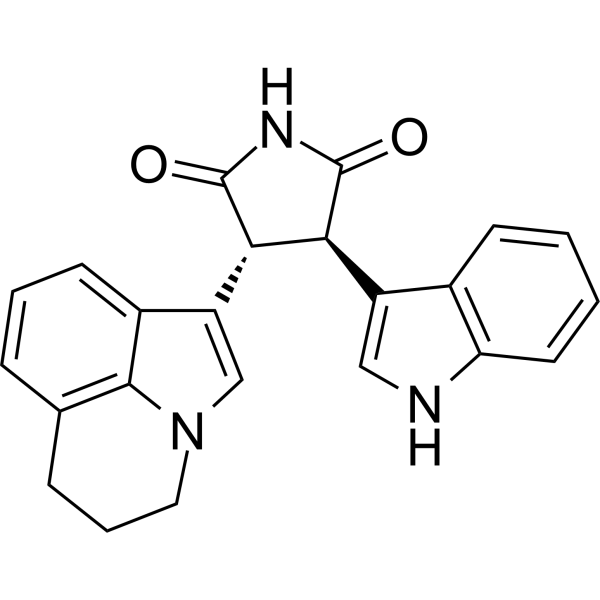
-
- HY-111050
-
|
|
c-Met/HGFR
|
Cancer
|
|
JNJ-38877618 is a potent, highly selective, orally bioavailable Met kinase inhibitor with IC50s of 2 and 3 nM for wild type and mutant Met, respectively.
|
-
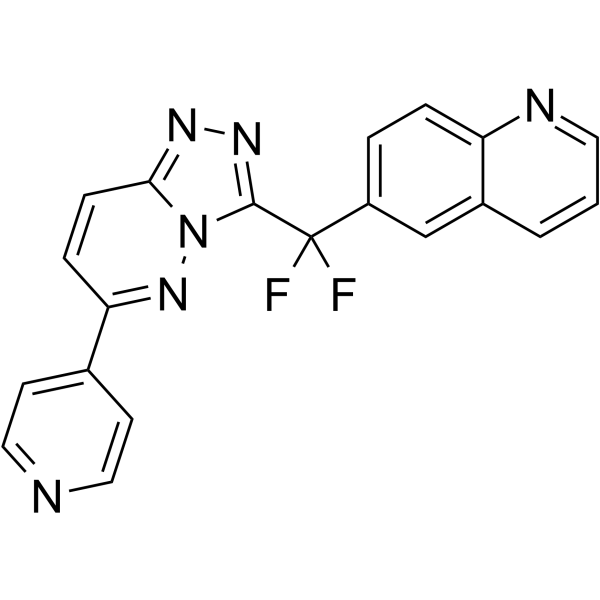
-
- HY-18696
-
|
|
c-Met/HGFR
Caspase
Apoptosis
|
Cancer
|
|
AMG-337 is a potent, orally active, selective MET kinase inhibitor with IC50 values of 1, 1, 4.7, 5, 21.5, 1077 and >4000 nM of WT MET, H1094R MET, M1250T MET, HGF-stimulated pMET (PC3 cells) MET, V1092I MET, Y1230H MET, and D1228H MET, respectively. AMG 337 inhibits the phosphorylation of MET and downstream effectors in MET-amplified cancer cell lines, resulting in an inhibition of MET-dependent cell proliferation and induction of apoptosis .
|
-
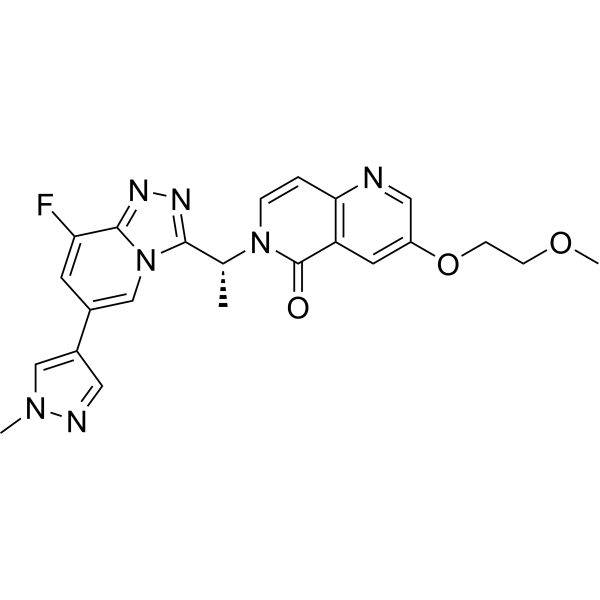
-
- HY-12017
-
|
|
c-Met/HGFR
|
Cancer
|
|
PF-04217903 is a potent ATP-competitive c-Met kinase inhibitor with Ki of 4.8 nM for human c-Met. PF-04217903 shows more than 1,000-fold selectivity relative to 208 kinases. Antiangiogenic properties .
|
-
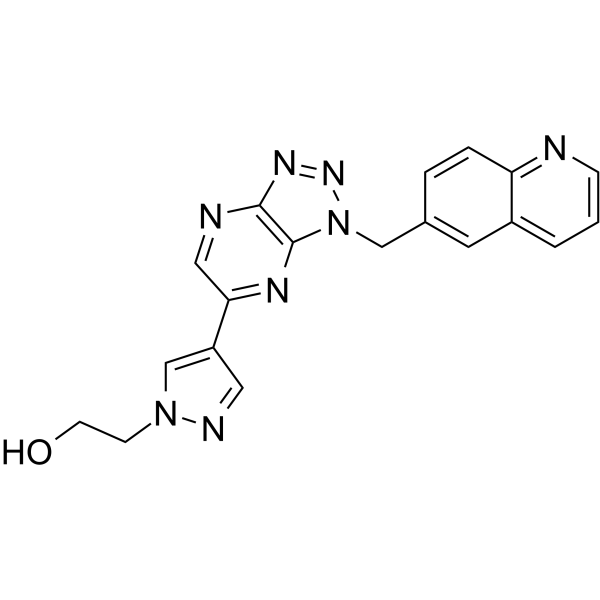
-
- HY-12017A
-
|
|
c-Met/HGFR
|
Cancer
|
|
PF-04217903 mesylate is a potent ATP-competitive c-Met kinase inhibitor with Ki of 4.8 nM for human c-Met. PF-04217903 mesylate shows more than 1,000-fold selectivity relative to 208 kinases. Antiangiogenic properties .
|
-
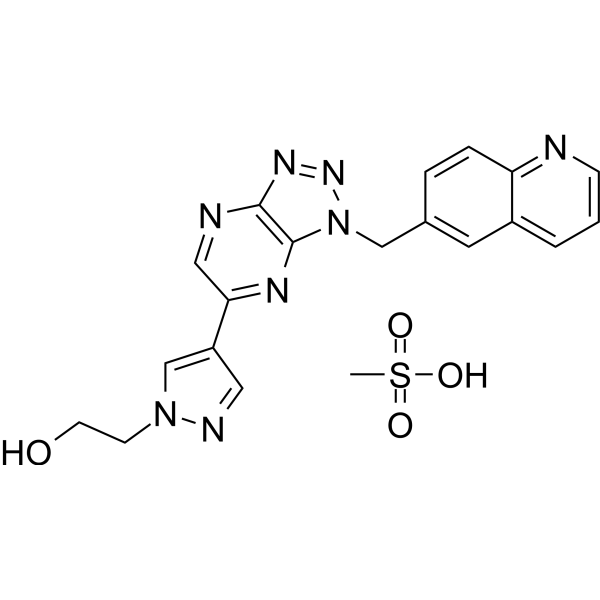
-
- HY-147218
-
|
|
c-Met/HGFR
TAM Receptor
|
Cancer
|
|
TAM&Met-IN-1 is a potent TAM and c-Met kinase inhibitor with IC50 values of 6.1 nM, 13.2 nM and 21.6 nM for AXL, MER and TYRO3, respectively. TAM&Met-IN-1 can be used for researching anticancer .
|
-
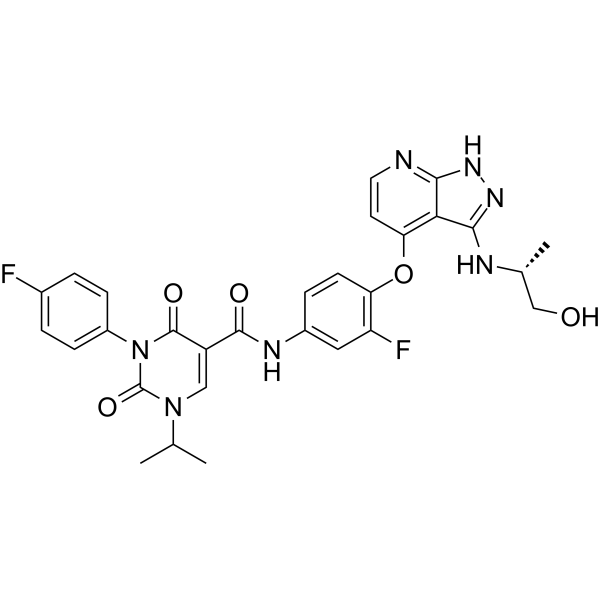
-
- HY-116000
-
|
Gumarontinib; SCC244
|
c-Met/HGFR
|
Cancer
|
|
Glumetinib (SCC244) is a highly selective, orally bioavailable, ATP-competitive c-Met inhibitor with an IC50 of 0.42 nM. Glumetinib has greater than 2400-fold selectivity for c-Met over those 312 kinases evaluated, including the c-Met family member RON and highly homologous kinases Axl, Mer, TyrO3. Antitumor activity .
|
-
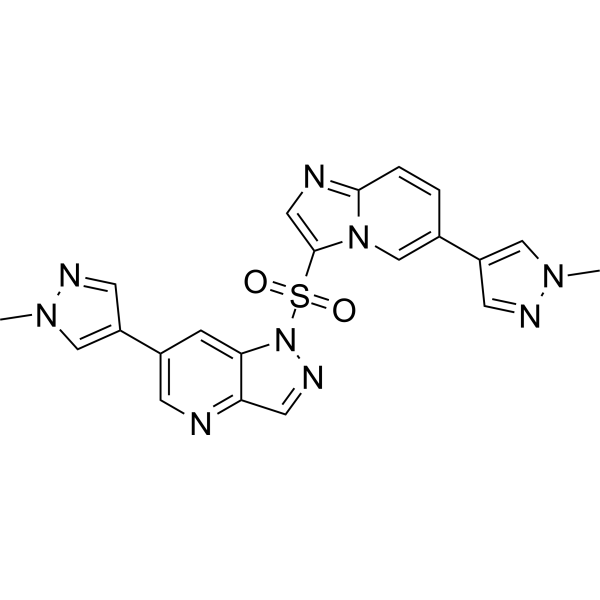
-
- HY-12019
-
|
|
c-Met/HGFR
|
Cancer
|
|
SGX523 is a exquisitely selective and ATP-competitive MET inhibitor. SGX523 potently inhibits MET with an IC50 of 4 nM and is >1,000-fold selective versus other protein kinases. Antitumor activity .
|
-
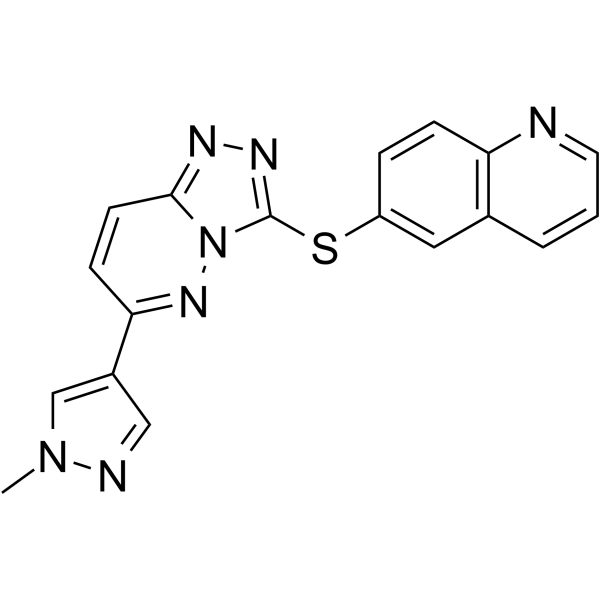
-
- HY-12017B
-
|
|
c-Met/HGFR
|
Cancer
|
|
PF-04217903 phenolsulfonate is a potent ATP-competitive c-Met kinase inhibitor with Ki of 4.8 nM for human c-Met. PF-04217903 phenolsulfonate shows more than 1,000-fold selectivity relative to 208 kinases. Antiangiogenic properties .
|
-
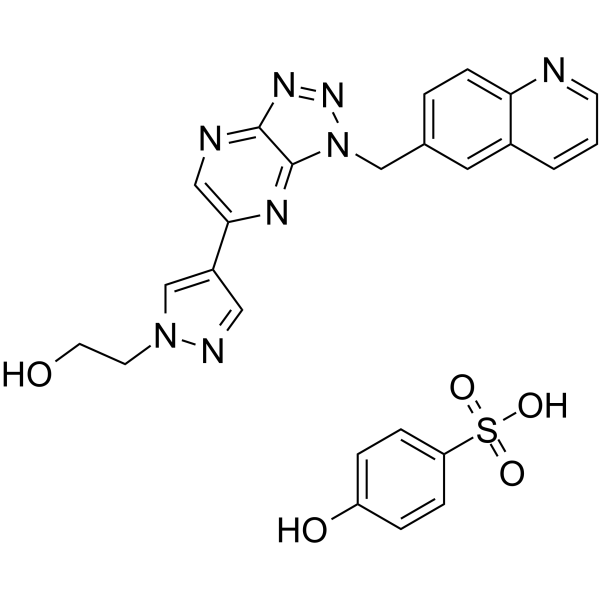
-
- HY-147259
-
|
|
c-Met/HGFR
|
Cancer
|
|
Dalmelitinib is an orally active selective c-Met kinase inhibitor (IC50: 2.9 nM) that binds to the ATP-binding region of c-Met. Dalmelitinib induces the phosphorylation of MET, partially or completely inhibits the phosphorylation of AKT and ERK. Dalmelitinib potently inhibits cancer cell (c-Met oncogene amplification) proliferation, and is used for the research of cancers like human non-small cell lung cancer (NSCLC) .
|
-
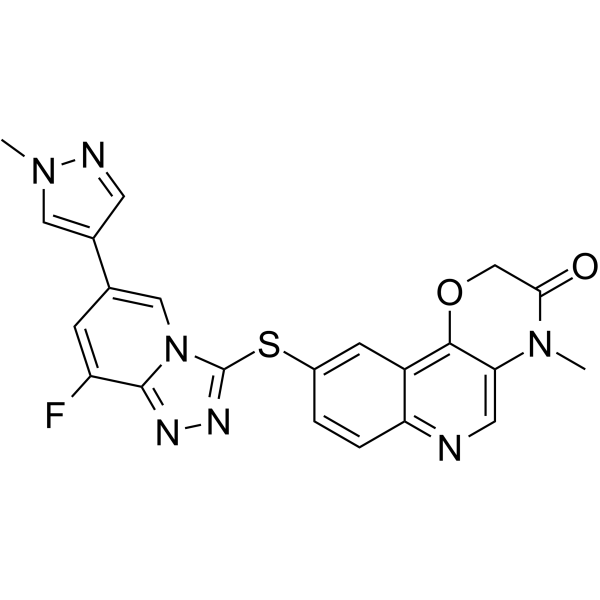
-
- HY-153831
-
|
|
c-Met/HGFR
|
Cancer
|
|
c-Met-IN-17 is a potent c-Met kinase inhibitor with an IC50 of 0.031 μM. c-Met-IN-17 can be used in anticancer research. . c-Met-IN-17 is a click chemistry reagent, it contains an Alkyne group and can undergo copper-catalyzed azide-alkyne cycloaddition (CuAAc) with molecules containing Azide groups.
|
-
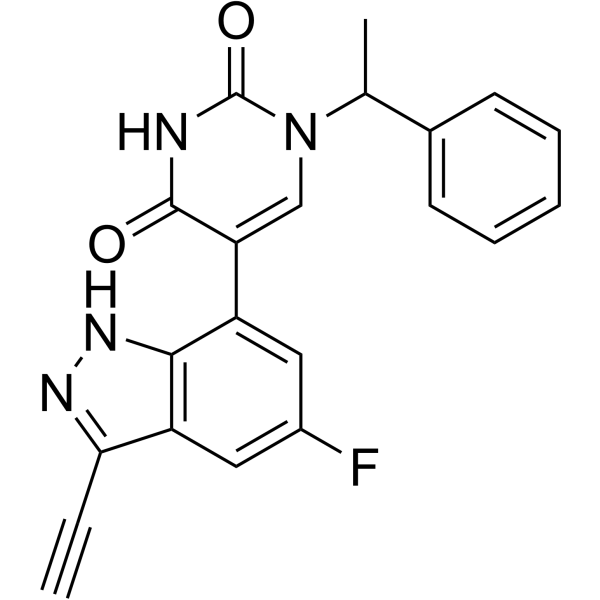
-
- HY-10338
-
|
XL880; GSK1363089; GSK089; EXEL-2880
|
VEGFR
c-Met/HGFR
|
Cancer
|
|
Foretinib is a multi-target tyrosine kinase inhibitor with IC50s of 0.4 nM and 0.9 nM for Met and KDR.
|
-
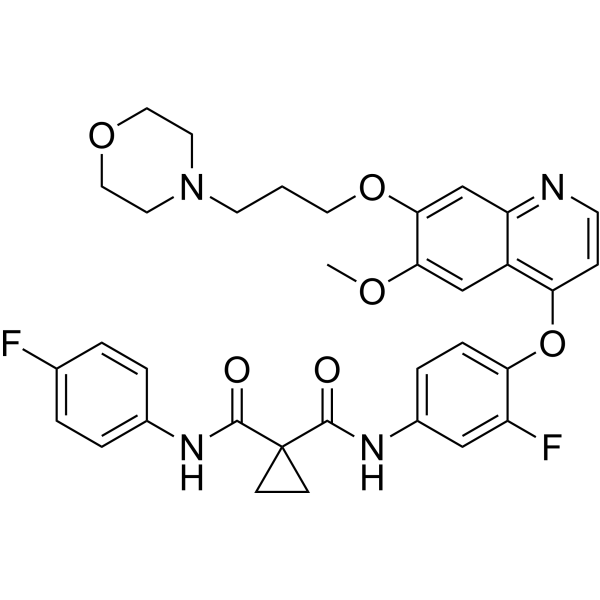
-
- HY-150582
-
|
|
c-Met/HGFR
c-Kit
FLT3
Apoptosis
|
Cancer
|
|
c-Met-IN-14 (compound 26af) is a selective inhibitor of c-Met kinase from N-sulfonylamidine-based derivatives, with an IC50 value of 2.89 nM. c-Met-IN-14 shows anticancer activity by blocking phosphorylation of c-Met, and arrests cell cycle at G2/M phase. c-Met-IN-14 induces apoptosis of A549 cells in a dose-dependent manner .
|
-
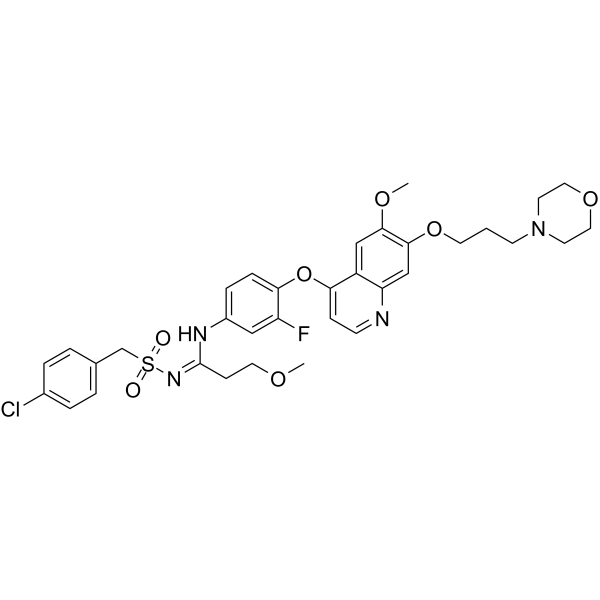
-
- HY-133083
-
|
|
c-Met/HGFR
|
Cancer
|
|
BAY-474 is a tyrosine-protein kinase c-Met inhibitor. BAY-474 acts as an epigenetics probe .
|
-
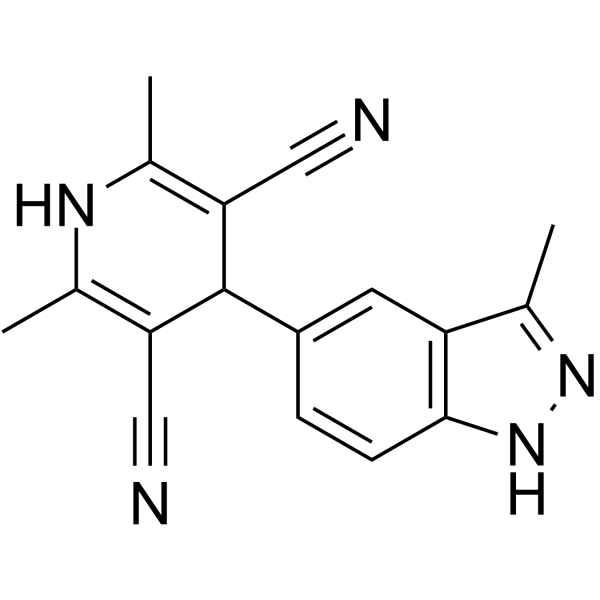
-
- HY-50683
-
|
|
c-Met/HGFR
|
Metabolic Disease
Cancer
|
|
JNJ-38877605 is an orally active ATP-competitive inhibitor of c-Met with an IC50 of 4 nM, 600-fold selective for c-Met than 200 other tyrosine and serine-threonine kinases . JNJ-38877605 inhibits c-Met phosphorylation and regulates lipid accumulation. JNJ-38877605 can be used for tumor and metabolic disease reseach .
|
-
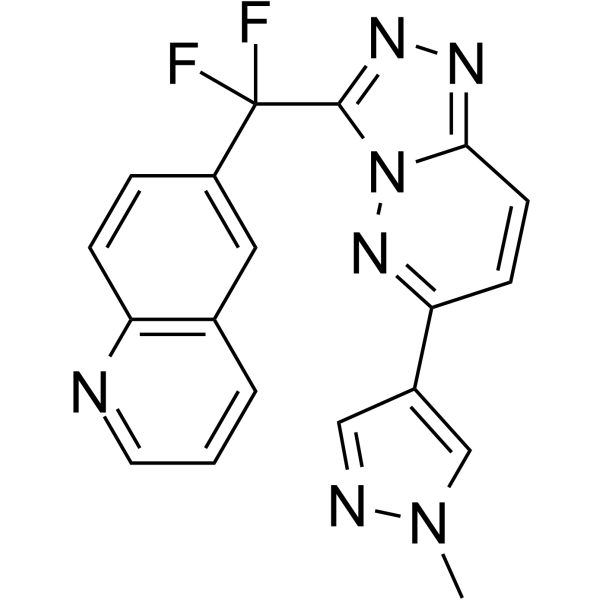
-
- HY-13068
-
|
E-7050
|
c-Met/HGFR
VEGFR
|
Cancer
|
|
Golvatinib (E-7050) is a potent dual inhibitor of both c-Met and VEGFR2 kinases with IC50s of 14 and 16 nM, respectively.
|
-
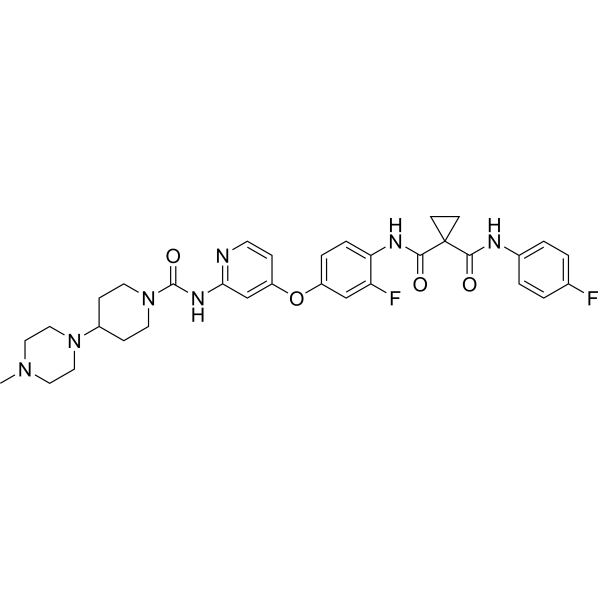
-
- HY-76688
-
|
(Rac)-ARQ 197; (Rac)-ARQ 198
|
Others
|
Cancer
|
|
(Rac)-Tivantinib is the isomer of Tivantinib (HY-50686), and can be used as an experimental control. Tivantinib is a highly selective c-Met tyrosine kinase inhibitor with a Ki of 355 nM.
|
-
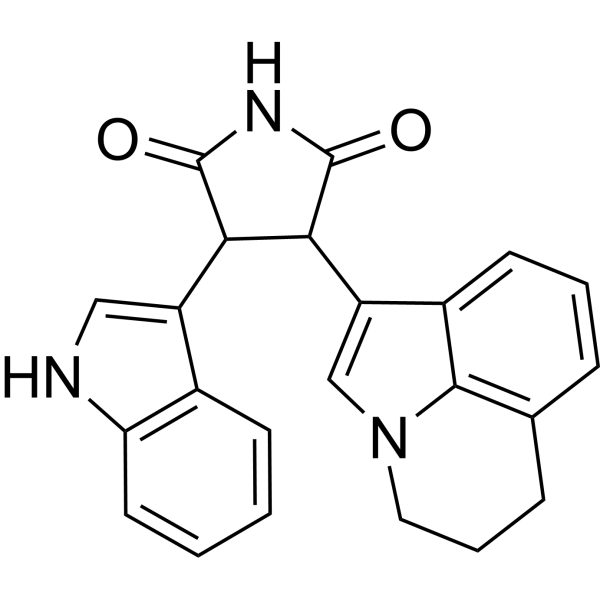
-
- HY-125017
-
|
PLB-1001; CBT-101; Vebreltinib
|
c-Met/HGFR
|
Cancer
|
|
Bozitinib (PLB-1001) is a highly selective c-MET kinase inhibitor with blood-brain barrier permeability. Bozitinib (PLB-1001) is a ATP-competitive small-molecule inhibitor, binds to the conventional ATP-binding pocket of the tyrosine kinase superfamily .
|
-
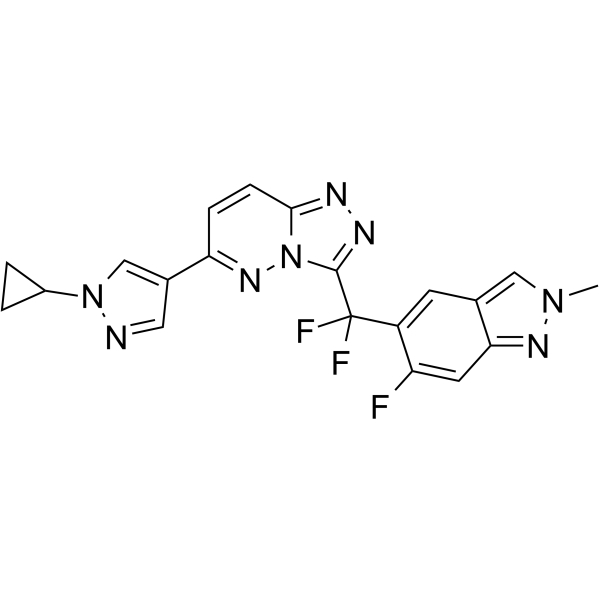
-
- HY-13404
-
|
INC280; INCB28060
|
c-Met/HGFR
Apoptosis
|
Cancer
|
|
Capmatinib (INC280; INCB28060) is a potent, orally active, selective, and ATP competitive c-Met kinase inhibitor (IC50=0.13 nM). Capmatinib can inhibit phosphorylation of c-MET as well as c-MET pathway downstream effectors such as ERK1/2, AKT, FAK, GAB1, and STAT3/5. Capmatinib potently inhibits c-MET-dependent tumor cell proliferation and migration and effectively induces apoptosis. Antitumor activity. Capmatinib is largely metabolized by CYP3A4 and aldehyde oxidase .
|
-
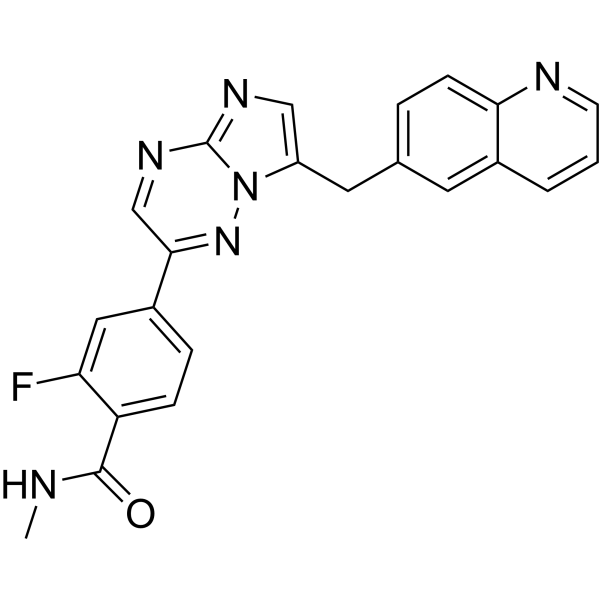
-
- HY-13404B
-
|
INC280 hydrochloride; INCB-28060 hydrochloride
|
c-Met/HGFR
Apoptosis
|
Cancer
|
|
Capmatinib (INC280; INCB28060) hydrochloride is a potent, orally active, selective, and ATP competitive c-Met kinase inhibitor (IC50=0.13 nM). Capmatinib hydrochloride can inhibit phosphorylation of c-MET as well as c-MET pathway downstream effectors such as ERK1/2, AKT, FAK, GAB1, and STAT3/5. Capmatinib hydrochloride potently inhibits c-MET-dependent tumor cell proliferation and migration and effectively induces apoptosis. Antitumor activity. Capmatinib hydrochloride is largely metabolized by CYP3A4 and aldehyde oxidase .
|
-
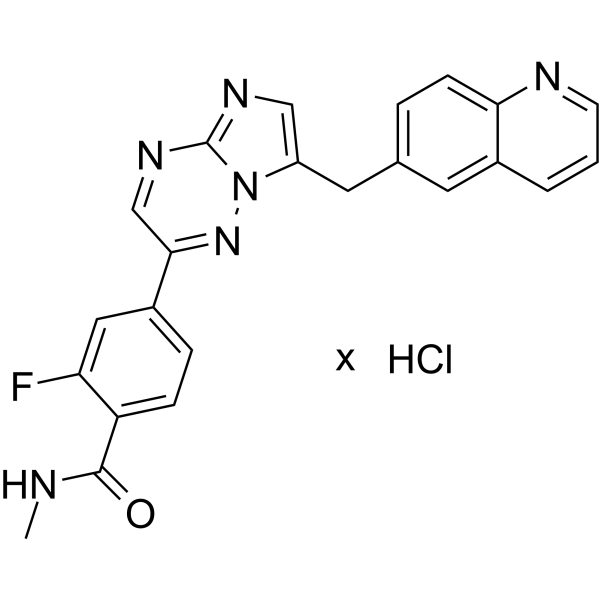
-
- HY-13404C
-
|
INC280 dihydrochloride hydrate; INCB-28060 dihydrochloride hydrate
|
c-Met/HGFR
Apoptosis
|
Cancer
|
|
Capmatinib (INC280; INCB28060) dihydrochloride hydrate is a potent, orally active, selective, and ATP competitive c-Met kinase inhibitor (IC50=0.13 nM). Capmatinib dihydrochloride hydrate can inhibit phosphorylation of c-MET as well as c-MET pathway downstream effectors such as ERK1/2, AKT, FAK, GAB1, and STAT3/5. Capmatinib dihydrochloride hydrate potently inhibits c-MET-dependent tumor cell proliferation and migration and effectively induces apoptosis. Antitumor activity. Capmatinib dihydrochloride hydrate is largely metabolized by CYP3A4 and aldehyde oxidase .
|
-
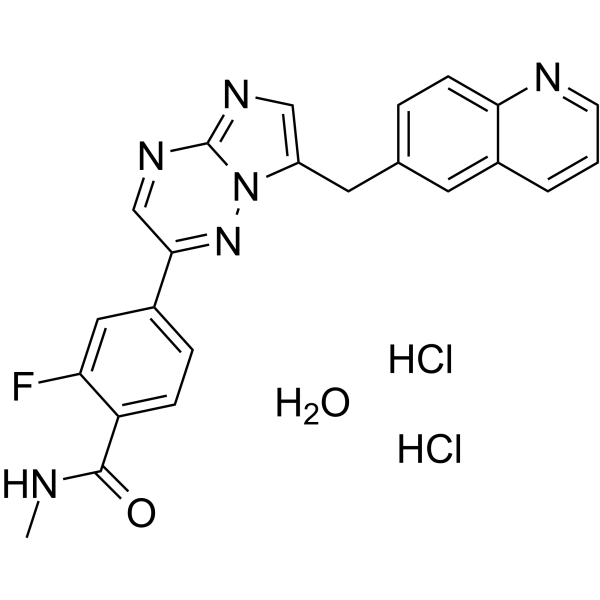
-
- HY-13404A
-
|
INC280 dihydrochloride; INCB28060 dihydrochloride
|
c-Met/HGFR
Apoptosis
|
Cancer
|
|
Capmatinib (INC280; INCB28060) dihydrochloride is a potent, orally active, selective, and ATP competitive c-Met kinase inhibitor (IC50=0.13 nM). Capmatinib dihydrochloride can inhibit phosphorylation of c-MET as well as c-MET pathway downstream effectors such as ERK1/2, AKT, FAK, GAB1, and STAT3/5. Capmatinib dihydrochloride potently inhibits c-MET-dependent tumor cell proliferation and migration and effectively induces apoptosis. Antitumor activity. Capmatinib dihydrochloride is largely metabolized by CYP3A4 and aldehyde oxidase .
|
-
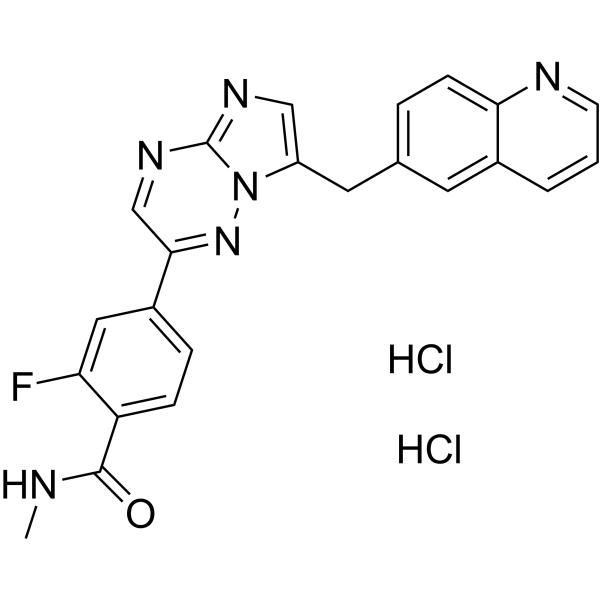
-
- HY-146274
-
|
|
c-Met/HGFR
Apoptosis
|
Cancer
|
|
c-Met-IN-10 (compound 26a) is a highly potent c-Met kinase inhibitor with an IC50 value of 16 nM. c-Met-IN-10 has inhibitory activity against cancer cells A549, H460 and HT-29 with IC50s of 0.56 ~ 1.59 μM. c-Met-IN-10 suppresses the colony formation on HT-29 cells, induces HT-29 and A549 cells apoptosis, and inhibits A549 cells motility. c-Met-IN-10 can be used for researching anticancer .
|
-
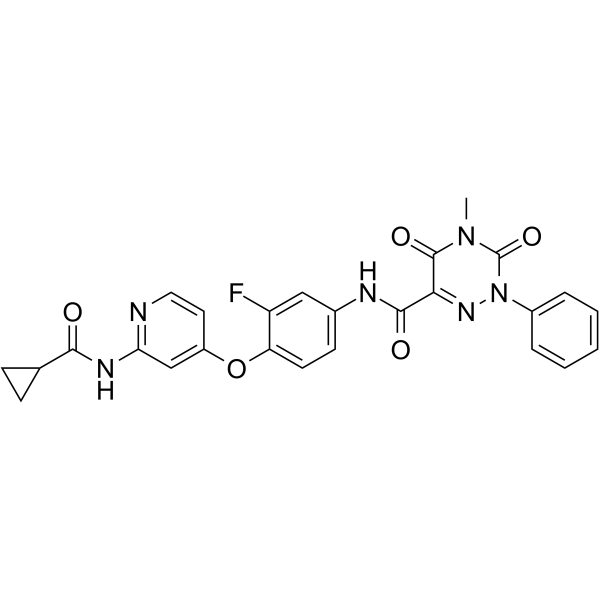
-
- HY-11107
-
|
|
c-Met/HGFR
Autophagy
Apoptosis
|
Cancer
|
|
PHA-665752 is a selective, ATP-competitive, and active-site inhibitor of the catalytic activity of c-Met kinase (Ki=4 nM; IC50=9 nM). PHA-665752 exhibits >50-fold selectivity for c-Met compared with a panel of diverse tyrosine and serine-threonine kinases. PHA-665752 induces apoptosis and cell cycle arrest, and exhibits cytoreductive antitumor activity .
|
-
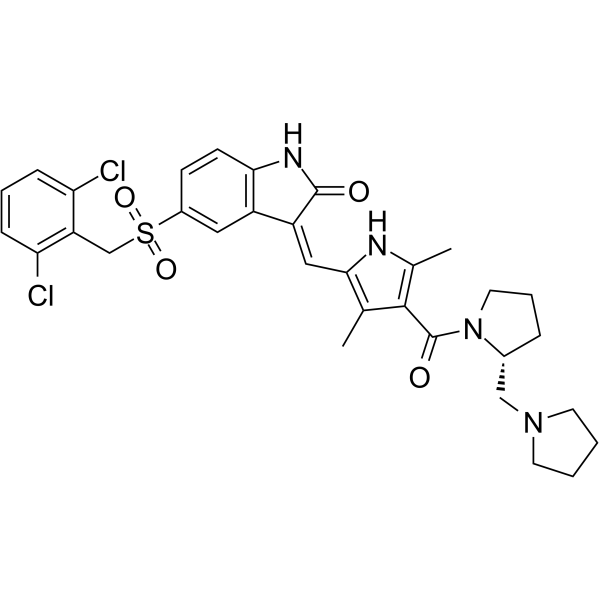
-
- HY-12076
-
|
BMS 817378
|
c-Met/HGFR
TAM Receptor
|
Cancer
|
|
BMS 777607 (BMS 817378) is a Met-related inhibitor for c-Met, Axl, Ron and Tyro3 with IC50s of 3.9 nM, 1.1 nM, 1.8 nM and 4.3 nM, respectively, and 40-fold more selective for Met-related targets than Lck, VEGFR-2, and TrkA/B, with more than 500-fold greater selectivity versus all other receptor and non receptor kinases .
|
-
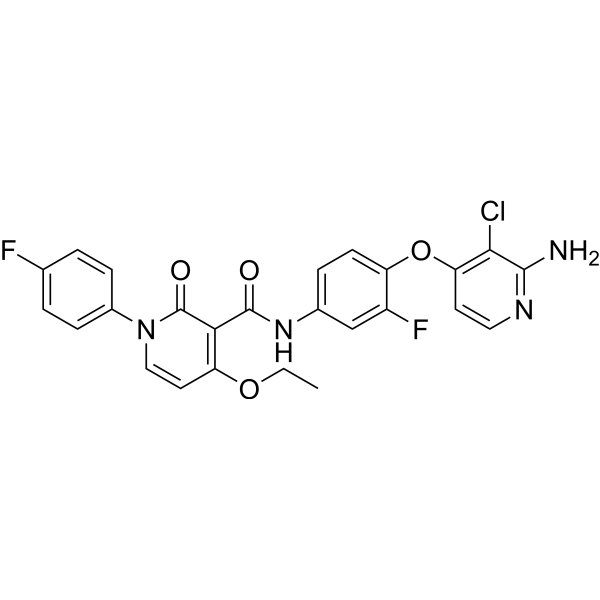
-
- HY-12423
-
|
TAS-115
|
VEGFR
c-Met/HGFR
|
Cancer
|
|
Pamufetinib (TAS-115) is a potent VEGFR and hepatocyte growth factor receptor (c-Met/HGFR)-targeted kinase inhibitor with IC50s of 30 and 32 nM for rVEGFR2 and rMET, respectively.
|
-
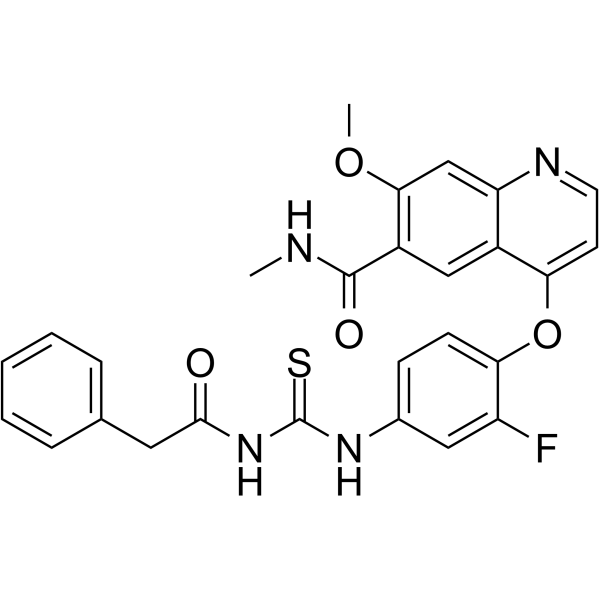
-
- HY-107145
-
|
|
TAM Receptor
VEGFR
c-Met/HGFR
|
Cancer
|
|
Ningetinib Tosylate is a potent, orally bioavailable small molecule tyrosine kinase inhibitor (TKI) with IC50s of 6.7, 1.9 and <1.0 nM for c-Met, VEGFR2 and Axl, respectively.
|
-
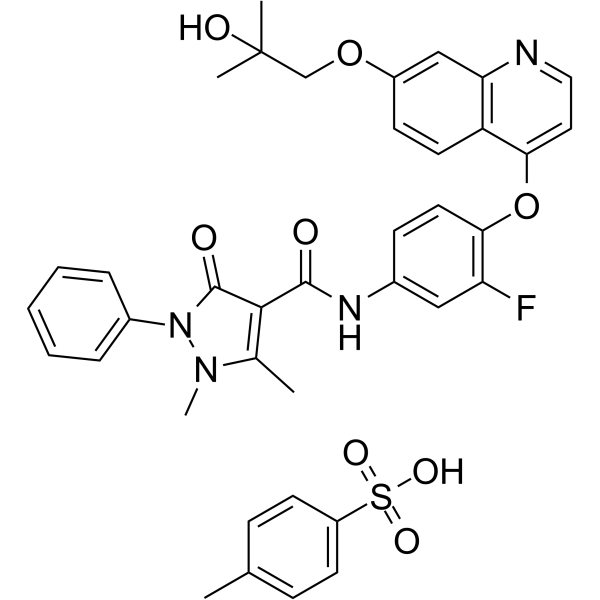
-
- HY-107145A
-
|
|
TAM Receptor
VEGFR
c-Met/HGFR
|
Cancer
|
|
Ningetinib is a potent, orally bioavailable small molecule tyrosine kinase inhibitor (TKI) with IC50s of 6.7, 1.9 and <1.0 nM for c-Met, VEGFR2 and Axl, respectively.
|
-
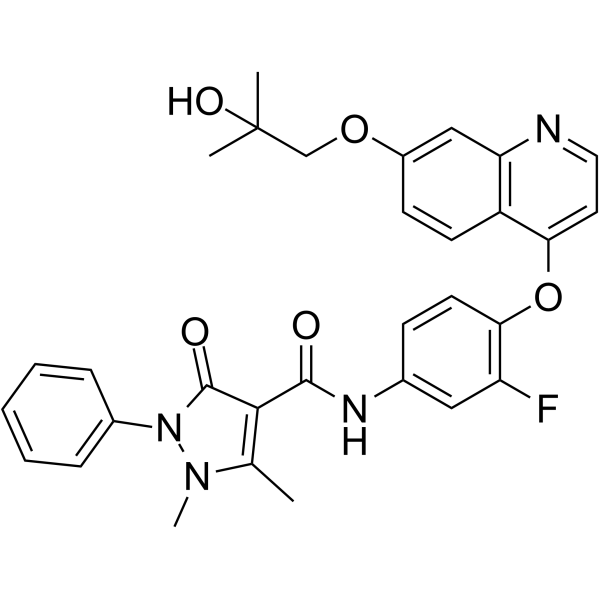
-
- HY-12423A
-
|
TAS-115 mesylate
|
VEGFR
c-Met/HGFR
|
Cancer
|
|
Pamufetinib (TAS-115) mesylate is a potent VEGFRand hepatocyte growth factor receptor (c-Met/HGFR)-targeted kinase inhibitor, with IC50s of 30 and 32 nM for rVEGFR2 and rMET, respectively.
|
-
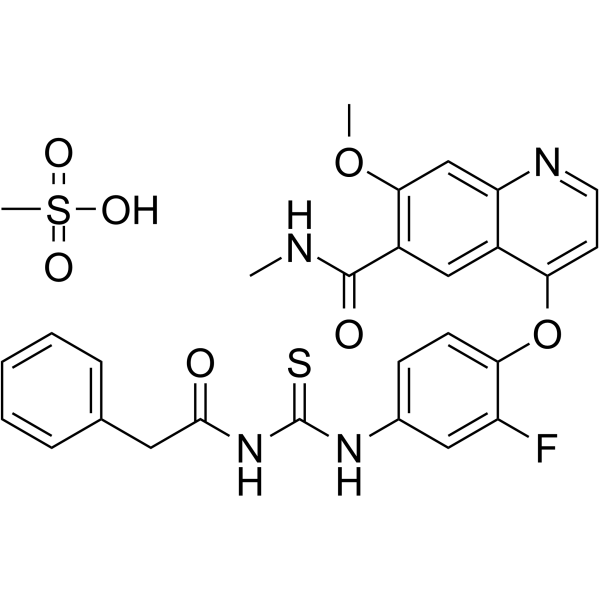
-
- HY-13299
-
MK-8033
2 Publications Verification
|
c-Met/HGFR
|
Cancer
|
|
MK-8033 is an orally active ATP competitive c-Met/Ron dual inhibitor (IC50s: 1 nM (c-Met),7 nM (Ron)), with preferential binding to the activated kinase conformation. MK-8033 can be used in the research of cancers, such as breast and bladder cancers, non-small cell lung cancers (NSCLCs) .
|
-
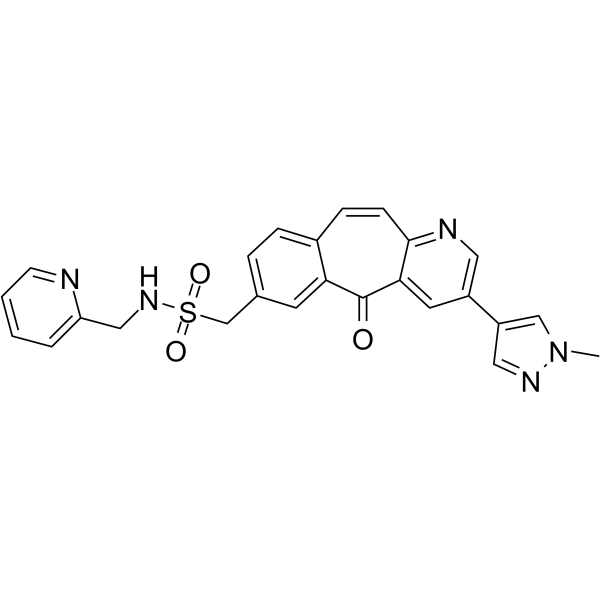
-
- HY-13299A
-
|
|
c-Met/HGFR
|
Cancer
|
|
MK-8033 hydrochloride is an orally active ATP competitive c-Met/Ron dual inhibitor (IC50s: 1 nM (c-Met),7 nM (Ron)), with preferential binding to the activated kinase conformation. MK-8033 hydrochloride can be used in the research of cancers, such as breast and bladder cancers, non-small cell lung cancers (NSCLCs) .
|
-
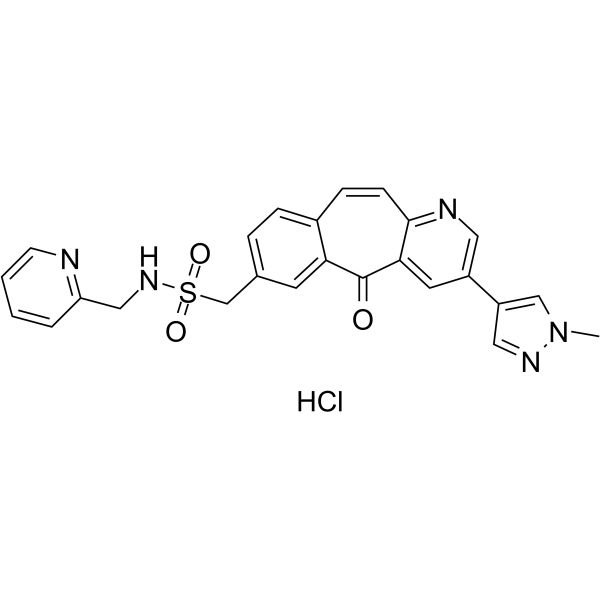
-
- HY-16446
-
|
|
c-Met/HGFR
PI3K
Akt
MEK
Apoptosis
|
Cancer
|
|
SAR125844 is a potent, selective, and ATP-competitive MET kinase inhibitor with the value of IC50 is 4.2 nM and Ki is 2.8 nM. SAR125844 has antitumor activity and can be used for the research of cancer .
|
-
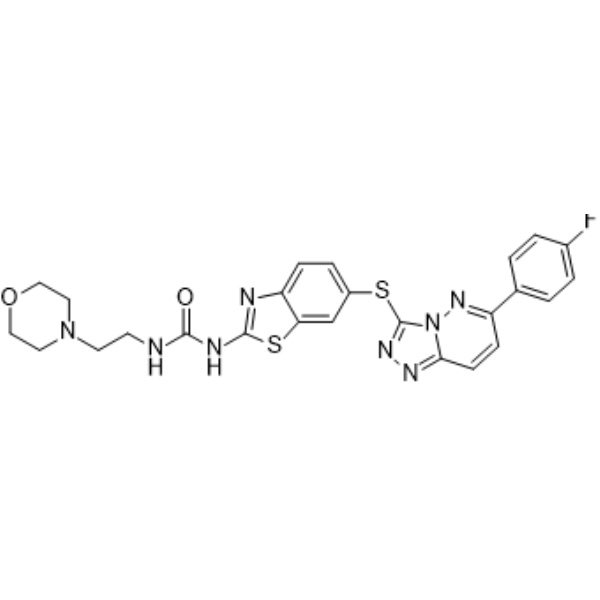
-
- HY-19642A
-
|
MGCD265 hydrochloride
|
TAM Receptor
c-Met/HGFR
|
Cancer
|
|
Glesatinib hydrochloride (MGCD265 hydrochloride) is an orally active, potent MET/SMO dual inhibitor. Glesatinib hydrochloride, a tyrosine kinase inhibitor, antagonizes P-glycoprotein (P-gp) mediated multidrug resistance (MDR) in non-small cell lung cancer (NSCLC) .
|
-
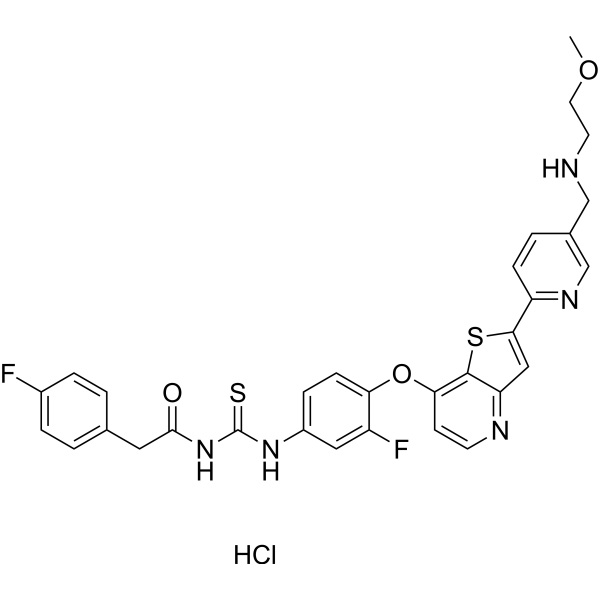
-
- HY-19642
-
|
MGCD265
|
TAM Receptor
c-Met/HGFR
|
Cancer
|
|
Glesatinib (MGCD265) is an orally active, potent MET/SMO dual inhibitor. Glesatinib, a tyrosine kinase inhibitor, antagonizes P-glycoprotein (P-gp) mediated multidrug resistance (MDR) in non-small cell lung cancer (NSCLC) .
|
-
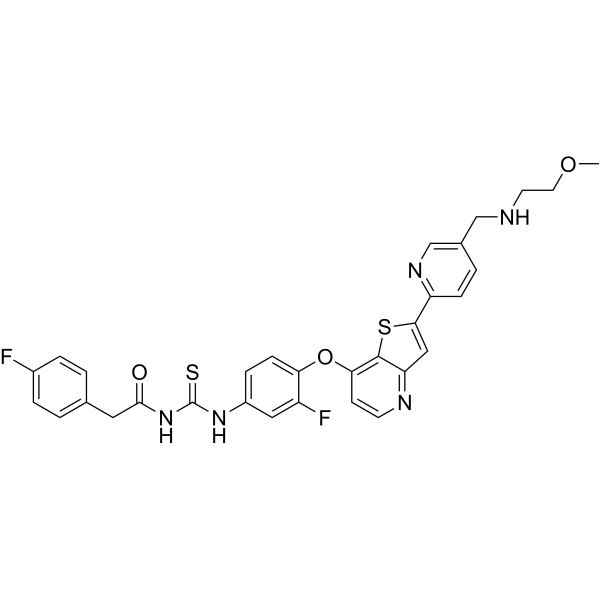
-
- HY-10991
-
|
|
c-Met/HGFR
VEGFR
Apoptosis
|
Cancer
|
|
MGCD-265 analog is a potent and oral active inhibitor of c-Met and VEGFR2 tyrosine kinases, with IC50s of 29 nM and 10 nM, respectively. MGCD-265 analog has significant antitumor activity .
|
-
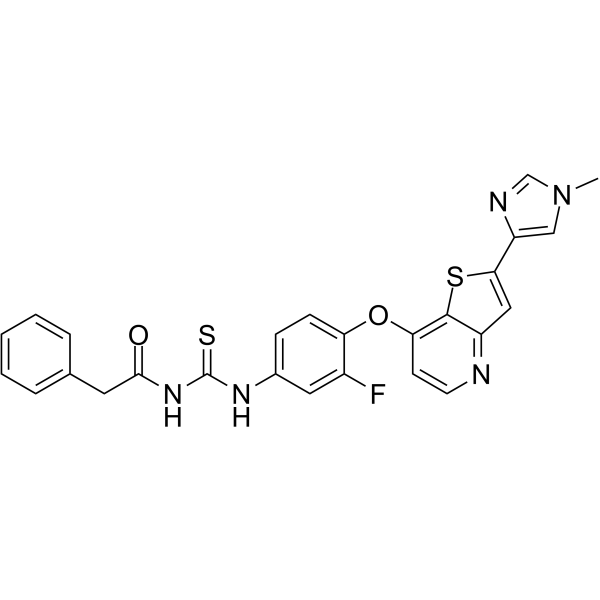
-
- HY-12044
-
|
XL184 S-malate; BMS-907351 S-malate
|
VEGFR
Apoptosis
|
Cancer
|
|
Cabozantinib S-malate (XL184 S-malate) is a potent multiple receptor tyrosine kinases inhibitor that inhibits VEGFR2, c-Met, Kit, Axl and Flt3 with IC50s of 0.035, 1.3, 4.6, 7 and 11.3 nM, respectively.
|
-
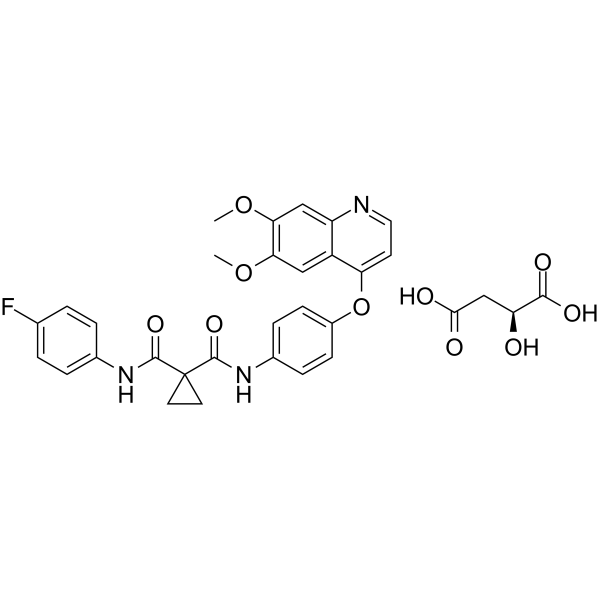
-
- HY-114356
-
|
|
c-Met/HGFR
|
Cancer
|
|
BPI-9016M is a potent, orally active, and selective dual c-Met and AXL tyrosine kinases inhibitor. BPI-9016M suppresses tumor cell growth, migration and invasion of lung adenocarcinoma .
|
-
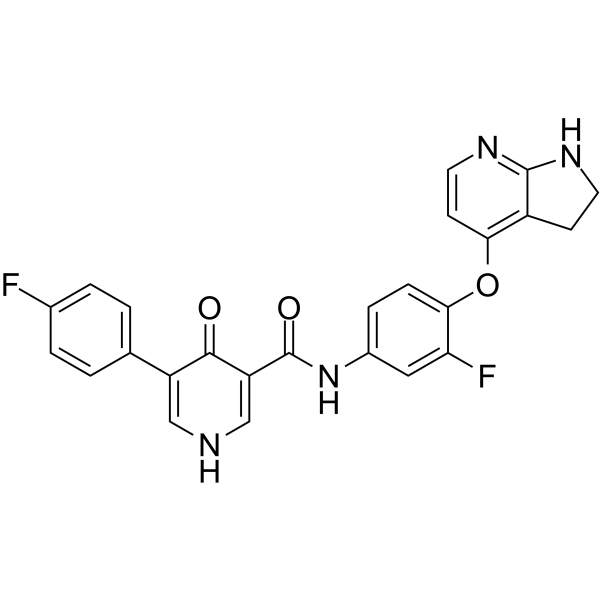
-
- HY-147413
-
|
TQ-B3101
|
EGFR
|
Cancer
|
|
Unecritinib (TQ-B3101) is a potent EGFR tyrosine kinase inhibitor. Unecritinib shows anticancer activity. Unecritinib inhibits ALK, ROS1, and MET. Unecritinib has the potential for the research of solid tumor and relapsed or refractory ALK-positive anaplastic large cell lymphoma .
|
-
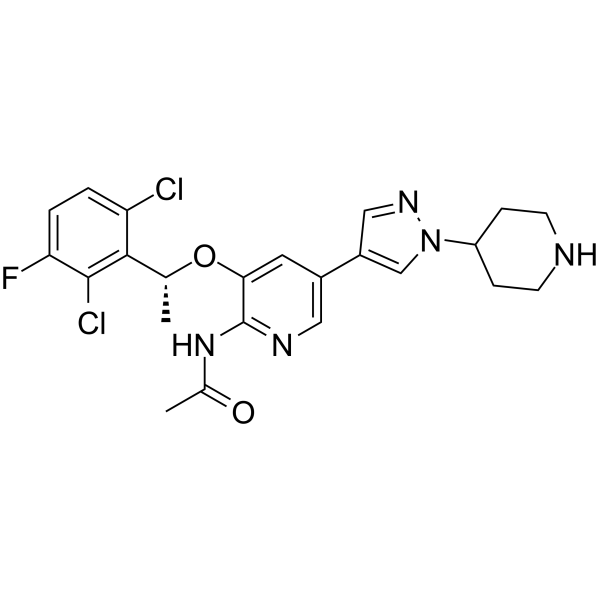
-
- HY-16590
-
X-376
1 Publications Verification
|
Anaplastic lymphoma kinase (ALK)
c-Met/HGFR
|
Cancer
|
|
X-376 is a potent and highly specific ALK tyrosine kinase inhibitor (TKI) (IC50=0.61 nM). X-376 is a less potent inhibitor of MET (IC50=0.69 nM). X-376 displays potent anti-tumor activity .
|
-
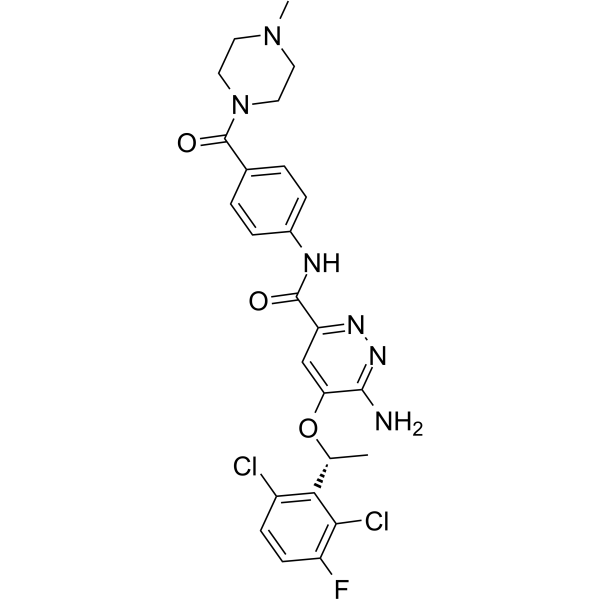
-
- HY-13016S1
-
|
XL184-d4; BMS-907351-d4
|
VEGFR
c-Met/HGFR
c-Kit
TAM Receptor
FLT3
Apoptosis
|
Cancer
|
|
Cabozantinib-d4 is deuterium labeled Cabozantinib. Cabozantinib is a potent multiple receptor tyrosine kinases (RTKs) inhibitor that inhibits VEGFR2, c-Met, Kit, Axl and Flt3 with IC50s of 0.035, 1.3, 4.6, 7 and 11.3 nM, respectively.
|
-
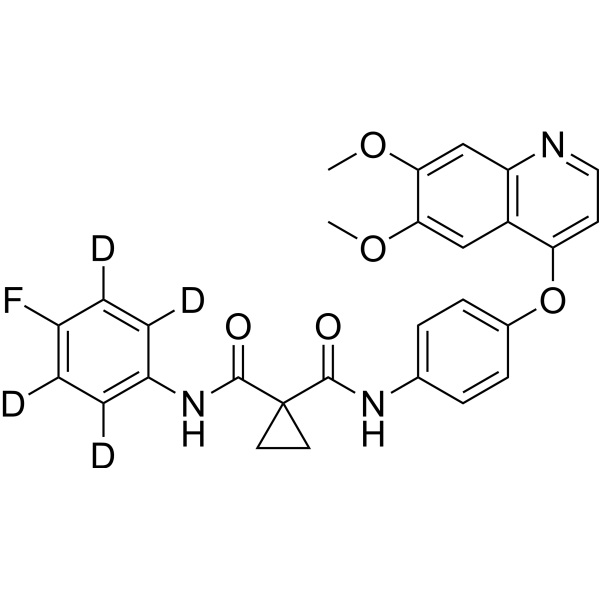
-
- HY-13260
-
|
|
Akt
Autophagy
Apoptosis
|
Cancer
|
|
CCT128930 is a ATP-competitive and selective inhibitor of AKT (IC50=6 nM for AKT2). CCT128930 has 28-fold selectivity over the closely related PKA kinase (IC50=168 nM) through the targeting of Met282 of AKT (Met173 of PKA-AKT chimera), as well as 20-fold selectivity over p70S6K (IC50=120 nM). Antitumor activity.
|
-
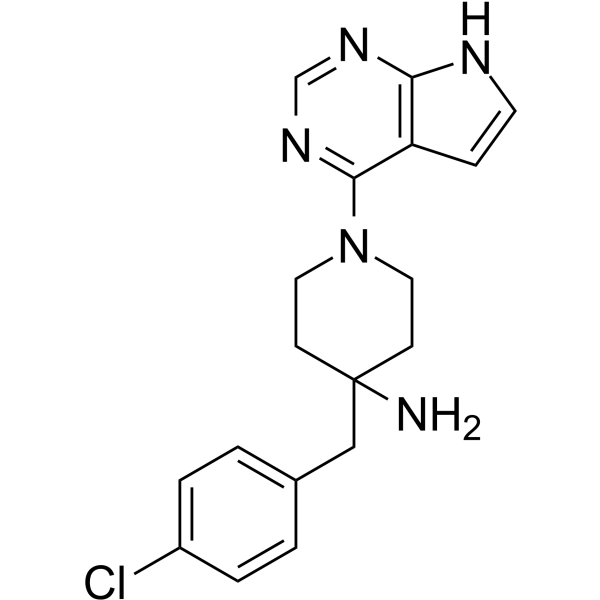
-
- HY-155544
-
|
|
c-Met/HGFR
|
Cancer
|
|
Antitumor agent-111 (compound 46) is an c-Met kinase inhibitor (IC50=46 nM) with antitumor and antiproliferative activity. Antitumor agent-111 arrests cell cycle at G0/G1 phase, and induces apoptosis .
|
-
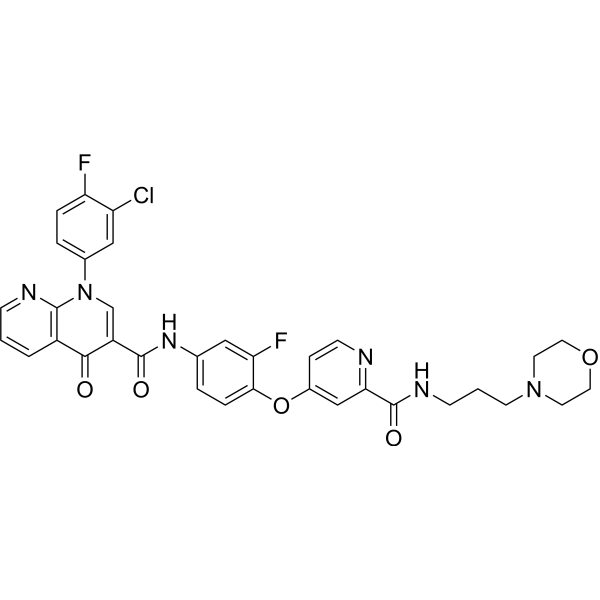
-
- HY-138696
-
|
XL092
|
TAM Receptor
c-Met/HGFR
VEGFR
|
Cancer
|
|
Zanzalintinib (XL092) is an orally active, ATP-competitive inhibitor of multiple receptor tyrosine kinases (RTKs) including MET, VEGFR2, AXL and MER, with IC50s in cell-based assays of 15 nM, 1.6 nM, 3.4 nM, 7.2 nM respectively. Zanzalintinib exhibits anti-tumor activity. Zanzalintinib has the potential for kinase-dependent diseases and conditions research .
|
-
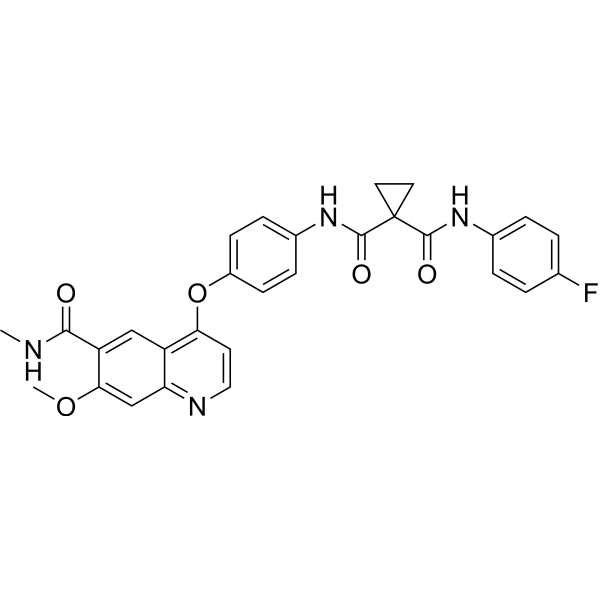
-
- HY-77493
-
|
(rel)-ARQ 197; (rel)-(3R,4R)-ARQ 198
|
Others
|
Cancer
|
|
(rel)-Tivantinib is a potent and highly selective inhibitor of the receptor tyrosine kinase c-MET. (rel)-Tivantinib has two novel targets, GSK3α and GSK3β, which play an important role in the cellular mechanism of non-small cell lung cancer (NSCLC) .
|
-
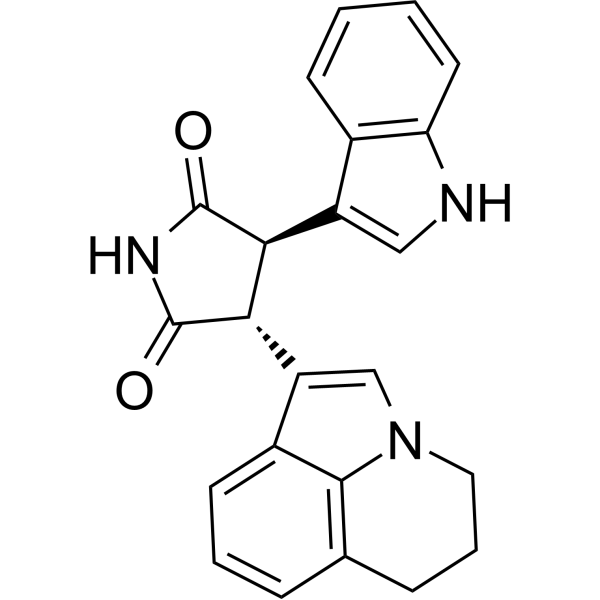
- HY-13016S
-
|
XL184-d6; BMS-907351-d6
|
VEGFR
c-Met/HGFR
c-Kit
TAM Receptor
FLT3
Apoptosis
|
Cancer
|
|
Cabozantinib-d6 is the deuterium labeled Cabozantinib. Cabozantinib is a potent multiple receptor tyrosine kinases (RTKs) inhibitor that inhibits VEGFR2, c-Met, Kit, Axl and Flt3 with IC50s of 0.035, 1.3, 4.6, 7 and 11.3 nM, respectively[1][2][3].
|
-
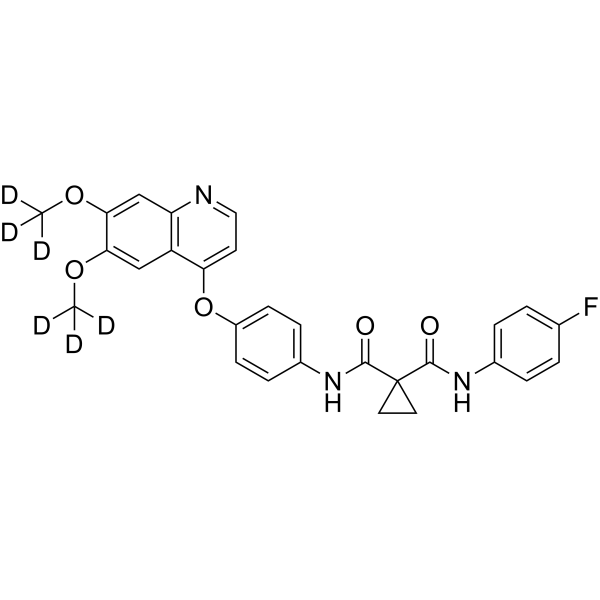
- HY-B0791
-
|
DCC-2701
|
VEGFR
c-Met/HGFR
FLT3
Trk Receptor
|
Cancer
|
|
Altiratinib (DCC-2701) is a multi-targeted kinase inhibitor with IC50s of 2.7, 8, 9.2, 9.3, 0.85, 4.6, 0.83 nM for MET, TIE2, VEGFR2, FLT3, Trk1, Trk2, and Trk3 respectively.
|
-
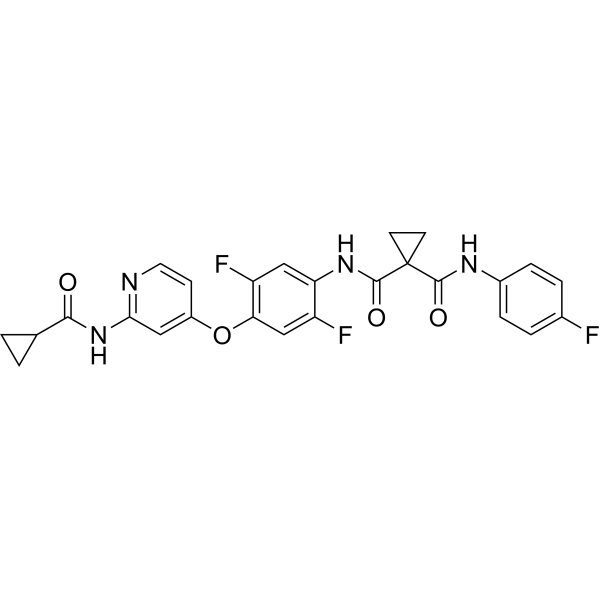
- HY-13260A
-
|
|
Akt
Autophagy
Apoptosis
|
Cancer
|
|
CCT128930 hydrochloride is a potent and selective inhibitor of AKT (IC50=6 nM). CCT128930 hydrochloride has 28-fold selectivity over the closely related PKA kinase (IC50=168 nM) through the targeting of Met282 of AKT (Met173 of PKA-AKT chimera), as well as 20-fold selectivity over p70S6K (IC50=120 nM). CCT128930 hydrochloride induces cell cycle arrest, DNA damage, and autophagy. Antitumor activity .
|
-
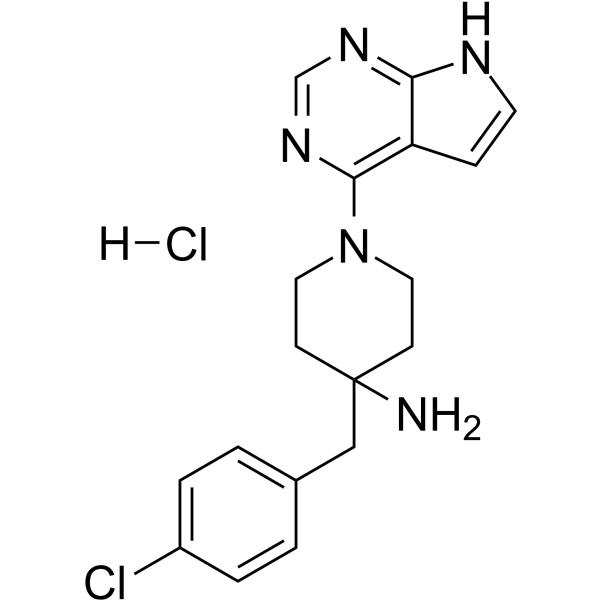
- HY-131064
-
|
|
RIP kinase
|
Inflammation/Immunology
|
|
RIPK3-IN-1 is a RIPK3 type II DFG-out inhibitor with an IC50 of 9.1 nM. RIPK3-IN-1 inhibits RIPK1 and RIPK2 with IC50s of 5.5 and >10 μM. RIPK3-IN-1 is also a c-Met kinase inhibitor with an IC50 of 1.1 μM .
|
-
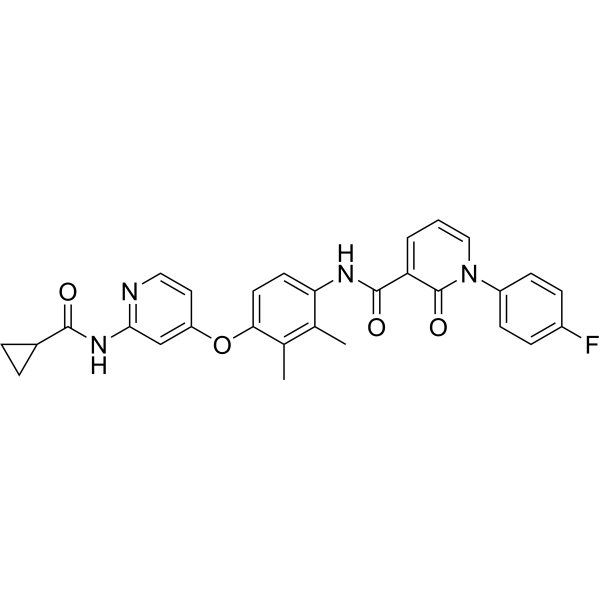
- HY-114357A
-
|
|
TAM Receptor
c-Met/HGFR
Trk Receptor
|
Cancer
|
|
DS-1205b free base is a potent and selective inhibitor of AXL kinase, with an IC50 of 1.3 nM. DS-1205b free base also inhibits MER, MET, and TRKA, with IC50s of 63, 104, and 407 nM, respectively. DS-1205b free base can inhibit cell migration in vitro and tumor growth in vivo .
|
-
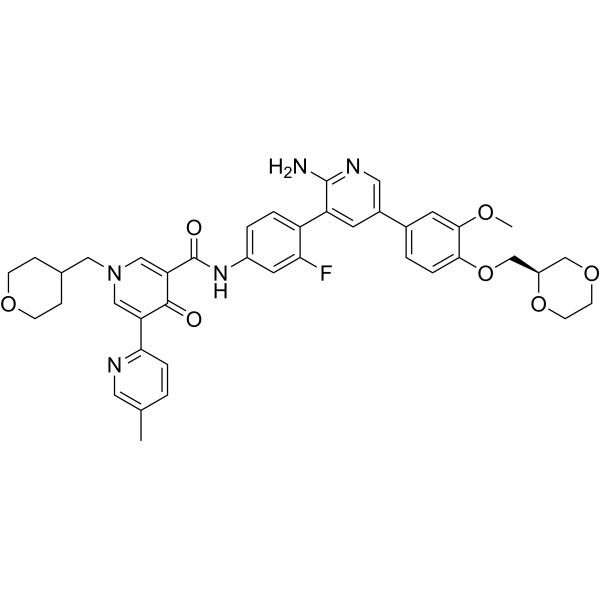
- HY-124761
-
|
|
Polo-like Kinase (PLK)
Autophagy
|
Cancer
|
|
Poloppin is a potent, cell penetrant inhibitor of the mitotic Polo-like kinase (PLK) (IC50=26.9 μM) and prevents the protein-protein interaction via the Polo-box domain (PBD) (Kd= 29.5 μM). Poloppin selectively kills cells expressing mutant KRAS, enhancing death in mitosis. Poloppin is used for the study of KRAS-mutant cancers as single agents, or in combination with c-MET inhibitors .
|
-
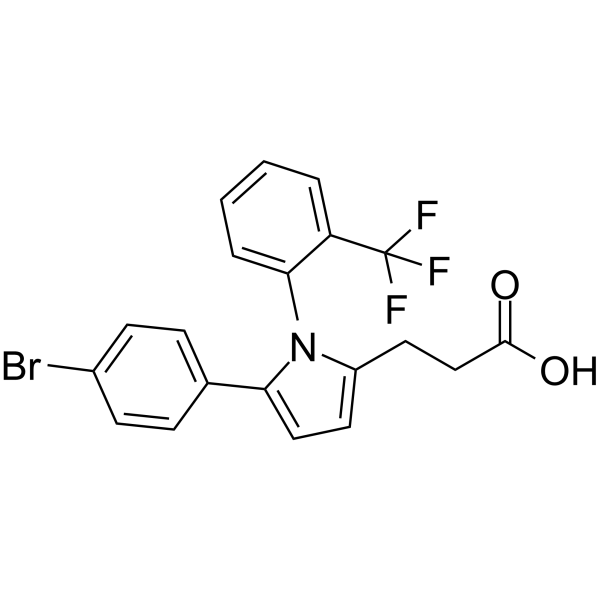
- HY-10206
-
|
MP470; HPK 56
|
c-Kit
PDGFR
RAD51
FLT3
c-Met/HGFR
RET
Apoptosis
|
Cancer
|
|
Amuvatinib (MP470) is an orally bioavailable multi-targeted tyrosine kinase inhibitor with potent activity against mutant c-Kit, PDGFRα, Flt3, c-Met and c-Ret. Amuvatinib (MP470) is also a DNA repair suppressor through suppression of DNA repair protein RAD51, thereby disrupting DNA damage repair . Antineoplastic activity .
|
-
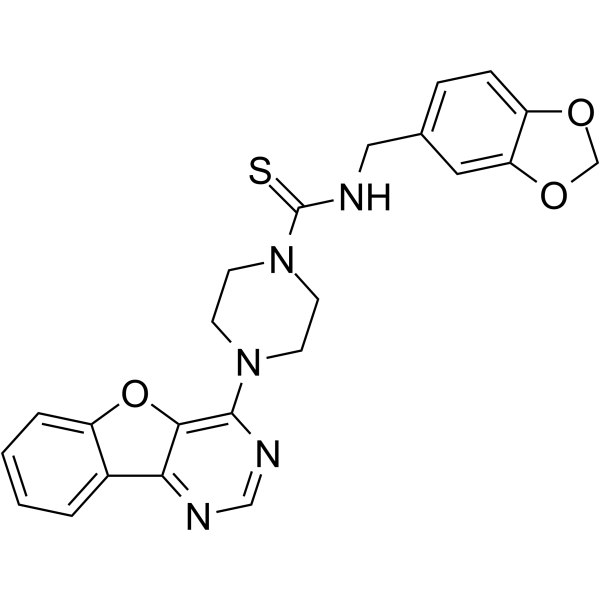
- HY-10206A
-
|
MP470 hydrochloride; HPK 56 hydrochloride
|
c-Kit
PDGFR
RAD51
FLT3
c-Met/HGFR
RET
|
Cancer
|
|
Amuvatinib hydrochloride (MP470 hydrochloride) is an orally bioavailable multi-targeted tyrosine kinase inhibitor with potent activity against mutant c-Kit, PDGFRα, Flt3, c-Met and c-Ret. Amuvatinib hydrochloride (MP470 hydrochloride) is also a DNA repair suppressor through suppression of DNA repair protein RAD51, thereby disrupting DNA damage repair . Antineoplastic activity .
|
-
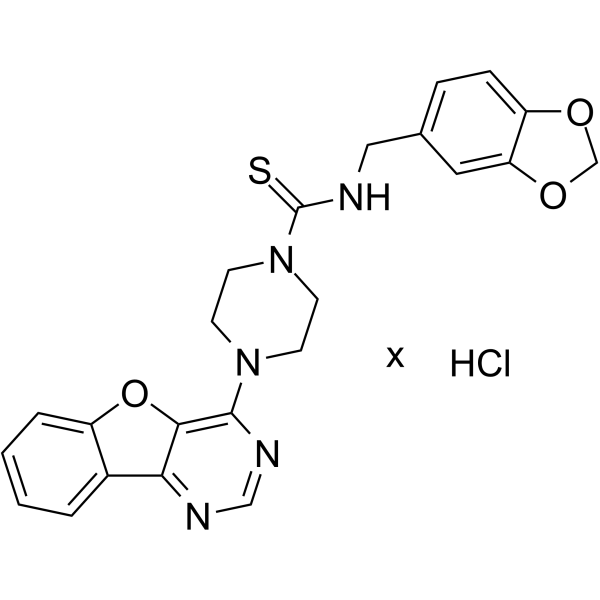
- HY-50687
-
|
(3S,4S)-ARQ 197; ARQ 198
|
Others
|
Cancer
|
|
(3S,4S)-Tivantinib is a potent and highly selective inhibitor of the receptor tyrosine kinase c-MET. (3S,4S)-Tivantinib has two novel targets, GSK3α and GSK3β, which play an important role in the cellular mechanism of non-small cell lung cancer (NSCLC) .
|
-
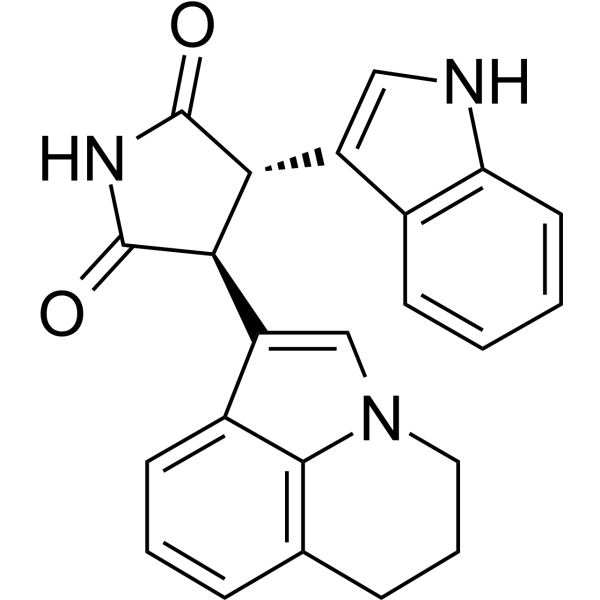
- HY-162103
-
|
|
TAM Receptor
Apoptosis
|
Cancer
|
|
Axl-IN-18 (compound 25c) is a potent and selective type II AXL inhibitor. Axl-IN-18 shows excellent AXL inhibitory activity (IC50=1.1 nM) and 343-fold selectivity over the highly homologous kinase MET in biochemical assays (IC50=377 nM). Axl-IN-18 significantly inhibits AXL-driven cell proliferation, dose-dependently suppresses 4T1 cell migration and invasion, and induces apoptosis. Axl-IN-18 shows noticeable antitumor efficacy in a BaF3/TEL-AXL xenograft model .
|
-
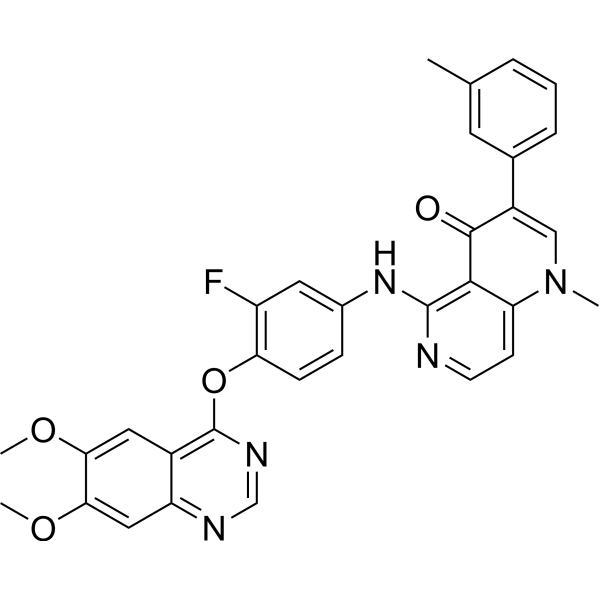
-
-
HY-L016
-
|
|
1055 compounds
|
|
Protein tyrosine kinases (PTKs) are key signaling molecules and important drug targets. Two classes of PTKs are present in cells: the transmembrane receptor PTKs (RTKs) and the nonreceptor PTKs. The RTK family includes the receptors for insulin and for many growth factors, such as EGFR, FGFR, PDGFR, VEGFR, and NGFR. RTKs are transmembrane glycoproteins that are activated by the binding of their ligands, and they transduce the extracellular signal to the cytoplasm by phosphorylating tyrosine residues on the receptors themselves (autophosphorylation) and on downstream signaling proteins. Their principal functions of PTKs involve the regulation of multicellular aspects of the organism. Cell to cell signals concerning growth, differentiation, adhesion, motility, and death are frequently transmitted through tyrosine kinases. In humans, tyrosine kinases have been demonstrated to play significant roles in the development of many disease states, including diabetes and cancers.
MCE designs a unique collection of 1055 compounds that act as a useful tool for PTKs-related drug screening and disease research.
|
| Cat. No. |
Product Name |
Target |
Research Area |
-
- HY-P3788
-
|
|
Peptides
|
Others
|
|
Ac-Asp-Tyr(2-malonyl)-Val-Pro-Met-Leu-NH2 is a peptide, can be used to synthesise tyrosine kinase inhibitor for hair growth reduction .
|
| Cat. No. |
Product Name |
Chemical Structure |
-
- HY-13016S
-
|
|
|
Cabozantinib-d6 is the deuterium labeled Cabozantinib. Cabozantinib is a potent multiple receptor tyrosine kinases (RTKs) inhibitor that inhibits VEGFR2, c-Met, Kit, Axl and Flt3 with IC50s of 0.035, 1.3, 4.6, 7 and 11.3 nM, respectively[1][2][3].
|
-

-
- HY-13016S1
-
|
|
|
Cabozantinib-d4 is deuterium labeled Cabozantinib. Cabozantinib is a potent multiple receptor tyrosine kinases (RTKs) inhibitor that inhibits VEGFR2, c-Met, Kit, Axl and Flt3 with IC50s of 0.035, 1.3, 4.6, 7 and 11.3 nM, respectively.
|
-

| Cat. No. |
Product Name |
|
Classification |
-
- HY-153831
-
|
|
|
Alkynes
|
|
c-Met-IN-17 is a potent c-Met kinase inhibitor with an IC50 of 0.031 μM. c-Met-IN-17 can be used in anticancer research. . c-Met-IN-17 is a click chemistry reagent, it contains an Alkyne group and can undergo copper-catalyzed azide-alkyne cycloaddition (CuAAc) with molecules containing Azide groups.
|
Your information is safe with us. * Required Fields.
Inquiry Information
- Product Name:
- Cat. No.:
- Quantity:
- MCE Japan Authorized Agent:




































































